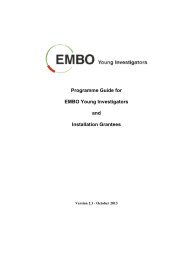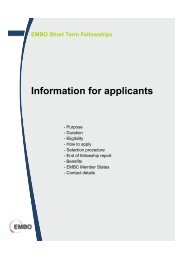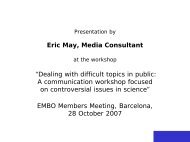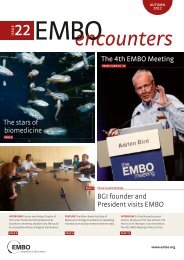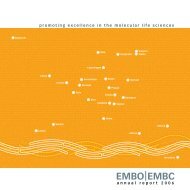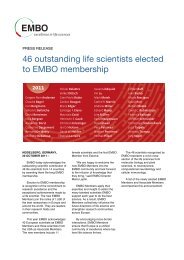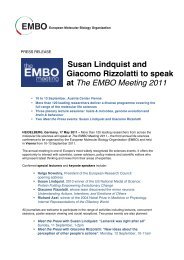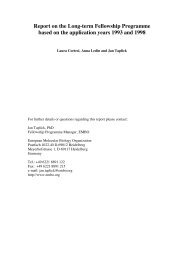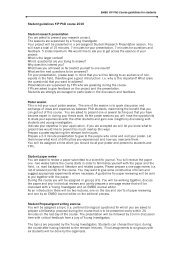EMBO Fellows Meeting 2012
EMBO Fellows Meeting 2012
EMBO Fellows Meeting 2012
Create successful ePaper yourself
Turn your PDF publications into a flip-book with our unique Google optimized e-Paper software.
Saskia Houwing<br />
<strong>EMBO</strong> <strong>Fellows</strong> <strong>Meeting</strong> <strong>2012</strong><br />
Activation of the germline transcriptional program in Drosophila<br />
Abstract<br />
In order to maintain the totipotency of germ cells and prevent differentiation, transcription of somatic genes<br />
must be repressed while transcription of germ genes must be activated. Repressors of RNA polymerase II (RNA<br />
pol II) transcription have been well described such as the maternally provided factor, polar granule component<br />
(pgc). However, it is unknown which proteins directly activate transcription in the germ cells after the inhibition<br />
of RNA pol II is lifted immediately following gastrulation. Neither genetic nor molecular screens have yet<br />
identified any maternal factors that encode for transcriptional regulators involved in germline-specific gene<br />
expression. Similarly, very few genes have been identified which are transcribed in germ cells at these earliest<br />
stages.<br />
Germ cells isolated from different stages of early Drosophila embryos were used to identify all transcripts by<br />
RNA-seq that are maternally provided and localize to germ cells, as well as transcripts that are expressed at<br />
the onset of zygotic transcription in the germline. Analysis of expression levels reveals 94 genes that are<br />
zygotically transcribed as early as embryonic stage 8-9, and 121 genes that are transcribed by stage 12-13, in<br />
Drosophila germ cells. These genes were used to search for transcription factor binding motifs in order to<br />
identify the transcriptional regulatory pathways that help specify germ cells. In addition, small RNA sequence<br />
information, as well as expression levels of long non-coding RNAs and transposons are helping us gain a<br />
complete picture of the processes that regulate germline gene expression.<br />
Skirball Institute, NYU School of Medicine, 540 First Avenue, New York, NY 10016, USA<br />
14-17 June <strong>2012</strong>, Heidelberg, Germany



